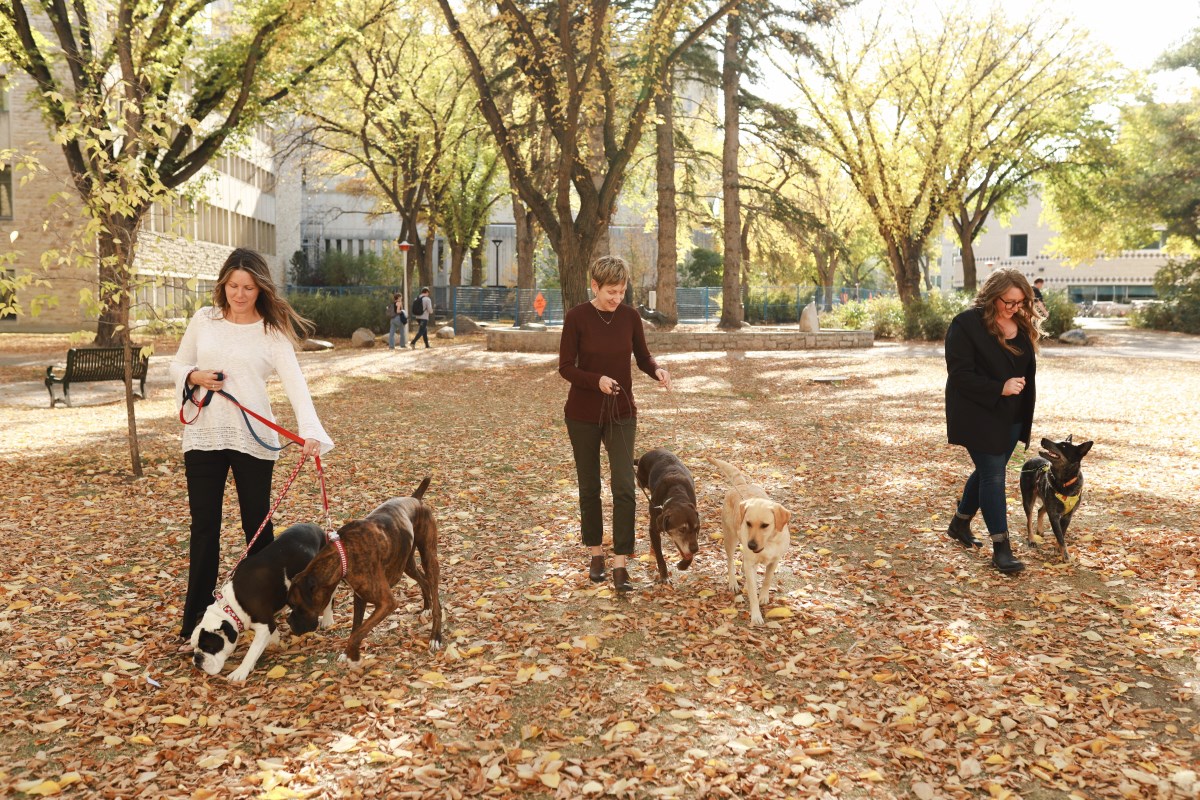Dr. Linzi Williamson (PhD) knows the benefits service dogs can have for veterans – and she hopes she can show the public those benefits, too.
Nov 8, 2023
"We're not asking the question anymore – at least my team isn't – if the dogs work, because we already have very strong evidence," she said. "It's about trying to figure out how do we optimize and figure out the best path forward, not just for the veterans but for the dogs as well."
Williamson, an assistant professor in the Department of Psychology and Health Studies in the College of Arts and Science at the University of Saskatchewan (USask), received more than $340,000 from the Canadian Institutes for Health Research (CIHR) for her project titled, "Supporting Canadian Veterans with Service Dogs." The funding is part of the Patient-Oriented Research – Transition to Leadership stream designed to support the careers of the "next generation" of patient-oriented researchers.
The project, which is a continuation of earlier work by Williamson and her team of patient partners, is a multifaceted exploration of how service dogs can provide support to Canadian veterans struggling with post-traumatic stress disorder (PTSD) and how organizations can better educate and communicate with the public as to how to interact with them.
"We've come to recognize there's a lot people don't understand about companion and service dogs," Williamson said. "So, part of my team's work is really going to be about developing different ways to teach people about the human-animal bond."
The new project is divided into three studies. The first will examine different methods for improving communication with the public about interacting with service dog teams, the second will explore how to maximize the human-animal bond between the service dog and their partner, and the third is a feasibility study for a "social return-on-investment" for service dogs for veterans – or what Williamson calls a "cost-benefit analysis" attempting to quantify the value of service dogs for veterans.
Williamson said she has seen first-hand the usefulness of service dogs in working with veterans, but there is not enough published data for many organizations to commit to supporting service dogs.
"The bottom line is not clear at this point. Many funding organizations don't understand fully whether or not the money is worth putting into these programs," Williamson said. "They want more research evidence … so my contribution to this will be this project."
Williamson said her research to this point has shown service dogs improve outcomes for veterans suffering from PTSD. She has seen men and women who previously would not want to leave their homes, and working with service dogs would have a visible impact on their lives.
"They were coming out of their shells, coming out of their homes and reintegrating into society. And that gives me goosebumps, just thinking about that. It's something we take for granted, especially if we don't experience PTSD symptoms," she said.
Williamson said the dogs have also shown a positive impact regarding harm reduction and substance use. The Canadian Centre on Substance Use and Addiction (CCSA) has also provided support for this project, matching CIHR's funding.
As Williamson puts it, it's not a matter of if service dogs work – it's a matter of displaying exactly how and why.
"When you see veterans or ex-military working with these dogs and all of a sudden there's just this complete change in who they are and what their lives are about, how can you not be into that? And I want to know, how did that happen?" she said.

 news.usask.ca
news.usask.ca
Nov 8, 2023
"We're not asking the question anymore – at least my team isn't – if the dogs work, because we already have very strong evidence," she said. "It's about trying to figure out how do we optimize and figure out the best path forward, not just for the veterans but for the dogs as well."
Williamson, an assistant professor in the Department of Psychology and Health Studies in the College of Arts and Science at the University of Saskatchewan (USask), received more than $340,000 from the Canadian Institutes for Health Research (CIHR) for her project titled, "Supporting Canadian Veterans with Service Dogs." The funding is part of the Patient-Oriented Research – Transition to Leadership stream designed to support the careers of the "next generation" of patient-oriented researchers.
The project, which is a continuation of earlier work by Williamson and her team of patient partners, is a multifaceted exploration of how service dogs can provide support to Canadian veterans struggling with post-traumatic stress disorder (PTSD) and how organizations can better educate and communicate with the public as to how to interact with them.
"We've come to recognize there's a lot people don't understand about companion and service dogs," Williamson said. "So, part of my team's work is really going to be about developing different ways to teach people about the human-animal bond."
The new project is divided into three studies. The first will examine different methods for improving communication with the public about interacting with service dog teams, the second will explore how to maximize the human-animal bond between the service dog and their partner, and the third is a feasibility study for a "social return-on-investment" for service dogs for veterans – or what Williamson calls a "cost-benefit analysis" attempting to quantify the value of service dogs for veterans.
Williamson said she has seen first-hand the usefulness of service dogs in working with veterans, but there is not enough published data for many organizations to commit to supporting service dogs.
"The bottom line is not clear at this point. Many funding organizations don't understand fully whether or not the money is worth putting into these programs," Williamson said. "They want more research evidence … so my contribution to this will be this project."
Williamson said her research to this point has shown service dogs improve outcomes for veterans suffering from PTSD. She has seen men and women who previously would not want to leave their homes, and working with service dogs would have a visible impact on their lives.
"They were coming out of their shells, coming out of their homes and reintegrating into society. And that gives me goosebumps, just thinking about that. It's something we take for granted, especially if we don't experience PTSD symptoms," she said.
Williamson said the dogs have also shown a positive impact regarding harm reduction and substance use. The Canadian Centre on Substance Use and Addiction (CCSA) has also provided support for this project, matching CIHR's funding.
As Williamson puts it, it's not a matter of if service dogs work – it's a matter of displaying exactly how and why.
"When you see veterans or ex-military working with these dogs and all of a sudden there's just this complete change in who they are and what their lives are about, how can you not be into that? And I want to know, how did that happen?" she said.

USask researcher explores value of service dogs for veterans
Dr. Linzi Williamson (PhD) knows the benefits service dogs can have for veterans – and she hopes she can show the public those benefits, too.










